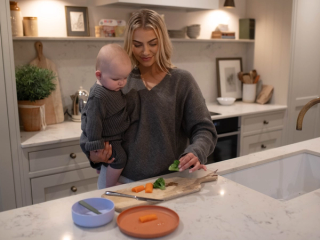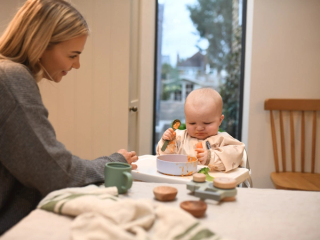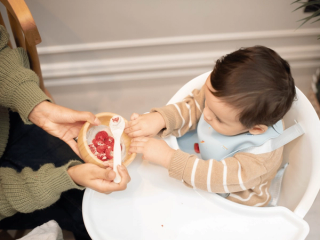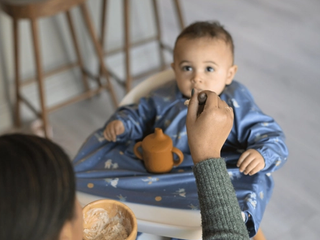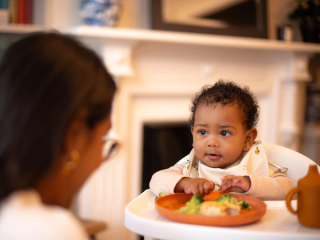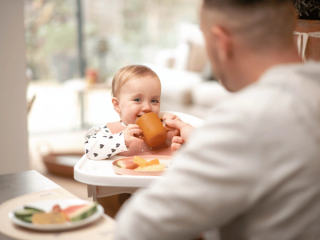
- Home
- Advice Hub
- Baby
- Weaning
- Moving Your Baby Onto Family Meals
Moving your baby onto family meals
The key to healthy eating for babies and toddlers is variety! No one food can give them every nutrient they need, and a wide range of food tastes and textures experienced now will help ensure they have a healthier diet as they grow older.
The key to healthy eating for babies and toddlers is variety! No one food can give them every nutrient they need, and a wide range of food tastes and textures experienced now will help ensure they have a healthier diet as they grow older. There are so many different foods readily available to us these days that, even if your baby has likes and dislikes, it should be possible to provide your baby with a varied, wholesome diet. Don’t worry if they go through phases of only wanting the same foods; this sometimes happens, but keep offering more different tastes along the way.
A healthy diet is one made up of a mixture of the 4 main food groups shown below:
- Starchy foods – Every baby or toddler meal should be based on starchy foods such as rice, pasta, potatoes, bread, chapatti, cereals, yam or plantain. Offering a variety of these at this stage, including slowly increasing amounts of wholegrains and high fibre foods, will provide valuable energy, fibre and other important nutrients. It is not a good idea to give only wholegrain starchy foods to under 2-year-olds as foods high in fibre can be very filling and result in babies not eating enough food to meet their energy and nutrient needs.
- Fruit and Veg - Include some sort of fruit and/or vegetables at every mealtime. Aim for 5 portions per day and choose as many different colours of fruit and veg as possible.
- Protein foods – Once weaning is established, aim to give your little one two to three servings of ‘protein’ foods such as meat, fish, eggs, beans or pulses, each day. Avoid giving them protein foods that are high in ‘bad’ saturated fats, e.g. fatty meats or fried foods. Foods high in ‘good’ fats, including omega-3 fats found in oily fish, can help with baby’s brain and nervous tissue development, so the recommendation is to offer 2 portions (around 30-40g) of fish each week to your baby, one of which is oily fish such as salmon, mackerel or sardines.
- Dairy foods – Dairy foods contain calcium, an important mineral for bone and teeth health. Include 1-2 servings of dairy foods such as yogurt or cheese each day, plus their usual milk feeds. Always choose full-fat dairy foods until your baby is 2 years of age. From 6 months up to around the age of one year, your baby should be drinking about 500ml milk (breast or formula) per day, but this should decrease to around 360ml for toddlers from 1 year onwards.
There is another food group, which is ‘Foods high in fat, salt and sugar’ – these should only be given in limited quantities. You should avoid giving your baby too many ‘free’ or added sugars found in foods such as biscuits, pastries or cakes. Too much sugar can lead to problems such as obesity and tooth decay. And make sure you don’t add any salt to your baby’s meals – they don’t need it and it can do harm!
As your baby reaches the end of their first year, they should have come a long way with their eating and should be having a wide range of different foods. This varied diet alongside their milk feeds and a vitamin supplement (containing vitamin A, C and D) should ensure they have all the nutrition they need, but if you are at all concerned, then have a chat with your GP or a healthcare professional.
Advice & tips

Want to read more? Join the HiPP BabyClub for full access to this article.
As a BabyClub member, you'll get access to a range of exclusive benefits, including:
Monthly competitions
Discounts from our Partners
Expert advice tailored to your little one's age
Weaning recipes
HiPP shop discounts*
*10% off HiPP's online shop does not apply to our First Infant, Anti-Reflux or Comfort Formula Milk.
Important notice: Breastfeeding is best. Follow on milk should only be used as part of a mixed diet from 6 months. Talk to a healthcare professional.






